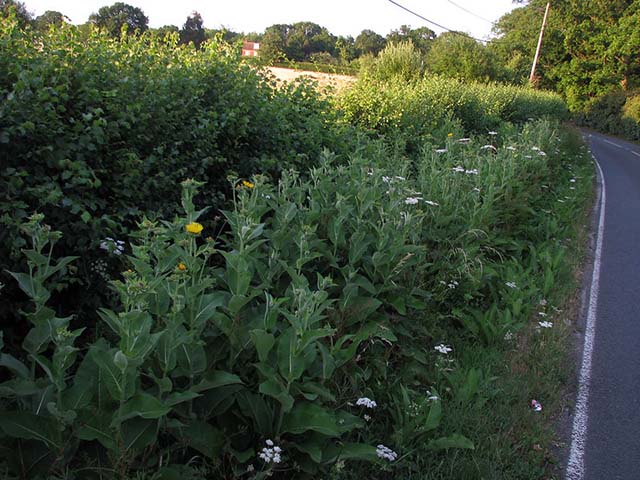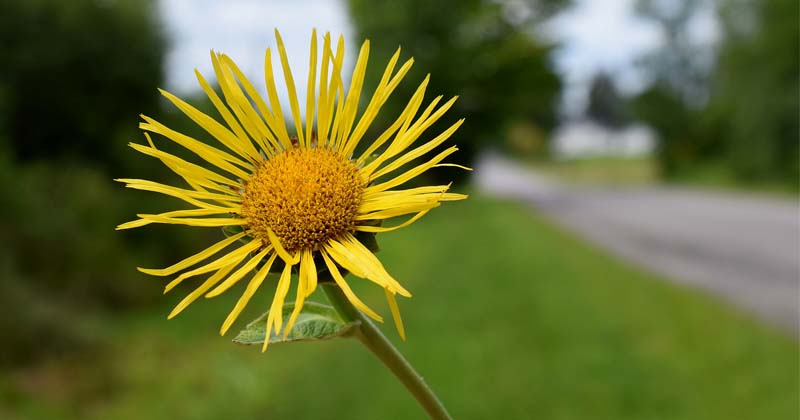A few years back, I got sick while traveling in Croatia. My host’s grandma immediately made me a spicy-tasting tea from the root of elecampane to help with my coughing. The elecampane, along with mullein leaf, seemed to do the trick. Even though elecampane has long been studied for its medicinal benefits, the pandemic has caused it to become highly in-demand and a staple product to keep in your first aid kit.
What Is Elecampane?
Elecampane is a medicinal plant which grows in Europe, Egypt and parts of Asia. It has been used for centuries to treat various ailments, especially coughs and intestinal parasites. Elecampane is even mentioned in the Bible multiple times; God told Prophet Job to use it to cure his skin boils. Paul the Apostle also recommended a drink from elecampane for digestive ailments. (1, 2)

Other Names for Elecampane
- Inula helenium (Latin)
- Helenii radix (also Latin)
- Elf dock
- Alant root
- Alantworzel (German)
- Yellow starwort
- Oman root
Health Benefits of Elecampane
Elecampane contains many compounds with known health benefits. These compounds include mucilage, sterols, inulin, azulenes, and alantolactone. Below are the main health benefits of elecampane, as backed by scientific research.
Coughs and Respiratory Ailments
Elecampane is an expectorant, meaning that it thins mucus and helps your body clear it from the airways. This makes elecampane a very good remedy for productive (wet) coughs. In addition to its expectorant properties, elecampane also is proven to help reduce respiratory inflammation, as with pneumonia. (3)
Antibacterial and Antifungal
In various studies, oil extracted from elecampane root was able to kill various strains of bacteria and fungi, including: candida (yeast infections), E. coli, M. tuberculosis, and Staphyloccocus aureus. Because of this, elecampane is being researched as an alternative to antibiotics as a solution to antibiotic resistance. (4, 5, 6, 7)
Skin Health
Elecampane is often found in many skin creams. Because it is a natural antibacterial and also anti-inflammatory, it is especially good for reducing redness and itchiness as well as curing skin eruptions. (8, 9)
Anti Cancer
One of the main benefits that elecampane is being studied for is its anti-cancer abilities. Various studies show that the plant’s root is toxic to tumor lines and inhibits tumor cell growth. (10, 11)
Antioxidants
Research shows that elecampane root contains an abundance of bioactive substances including antioxidants like phenolic compounds, flavonoids, terpenes, and sesquiterpene lactone. Because of these antioxidants, elecampane has shown to protect the body against damage from stress and also from neurodegenerative diseases. (12, 13, 14, 15, 16, 17)
Gut Health
Traditionally, elecampane was used to kill parasites in the intestines naturally. In addition to this health benefit, research shows that elecampane can help with other gut disorders. It not only kills “bad” bacteria in the gut like E. coli, but actually helps increase amounts of “good” bacteria like Lactobacillus. Unbalanced gut flora (gut dysbiosis) is the root cause of many disorders including IBS, SIBO and psoriasis, so taking elecampane could help with these conditions. (18, 19)
How to Take Elecampane
To get health benefits, you should take the root of elecampane (not the leaves or flowers). You can drink the dried root as an infusion/herbal tea. Unlike many other medicinal plants, elecampane root actually has a pleasant spicy taste. However, you’ll have to drink a lot of elecampane tea to help with serious health ailments. A more effective method is to take powdered elecampane root or extracts.
Elecampane Oil, Alcohol or Glycerin Extract?
To extract the healthy compounds from elecampane, the root is soaked in oil, alcohol or glycerin. As a general rule, alcohol extracts (also known as tinctures) are the most powerful and have the longest shelf life.
However, one of the main active compounds in elecampane is mucilage. This mucilage is why elecampane (along with mullein leaf) is so good at breaking down mucus in the airways. Mucilage does NOT dissolve into alcohol well. For this reason, do not take alcohol-based elecampane extracts for cough.
Instead, choose an oil-based elecampane extract for treating cough. Alternatively, you can choose a glycerin-based extract. Glycerin doesn’t extract mucilage as well as oil, but it does have a much longer shelf life and preserves the other healthy compounds of elecampane very well.
Elecampane Dosage
There is no set dosage for elecampane. As a powder, the recommended dosage is usually 1-4 grams per day. As an extract, the dosage is usually up to 1ml (about 30 drops) taken up to 4 times per day. However, the dosage can vary drastically depending on the strength of the particular elecampane extract. (20)
Side Effects of Elecampane
Elecampane is generally considered very safe. However, it could affect blood pressure and blood sugar. As with any natural remedy, consult your doctor before taking elecampane – especially if you are diabetic or taking blood pressure medicines.
Also note that elecampane is in the Asteraceae family which includes plants like chamomile and daisy. A lot of people are allergic to plants in this family. Don’t take elecampane if you have allergies to other Asteraceae plants. It’s also smart to test elecampane skin products on a small area of skin before using.
Best Elecampane Root Supplements
The following elecampane root products are all from trustworthy brands. The elecampane extracts also have high menstruum ratios (amount of dry root per solvent). Some of these products also contain other herbs for treating cough and respiratory conditions.
1. Gaia Herbs Mighty Lungs Blend
- Contains holy basil and organic mullein, marshmallow, plantain, elecampane, grindelia, red root, hawthorn and schisandra berry
- Vegetable glycerin extract
- 437mg of extract per capsule
- Highly concentrated: 1600mg dry herb equivalent per capsule
- Vegan capsules
- Buy Here
2. Herbal Medicine Lung Tonic
- Contains mullein, horehound, elecampane, grindelia, Echinacea, pleurisy root, passionflower, osha root, lobelia and Yerba Santa leaf
- Mostly organic
- Olive oil extract
- 200mg of herbs per capsule
- Gelatin capsules
- Buy Here
3. Herbal Terra Organic Elecampane Root Extract
- 1:3 menstruum ratio (330mg dried elecampane root equivalent per serving)
- Glycerin extract
- 1ml serving; 120 servings per bottle
- Buy Here
4. Tribe Elecampane Root Extract
- 1:3 menstruum ratio (333mg dried elecampane root per serving)
- Glycerin extract
- 7ml serving; 84 servings per 2 fl. Oz. bottle
- Buy Here
5. Floria Herbal Pharmacy Dried Elecampane Root
- Sourced in Serbia
- Loose-grind suitable for making tea
- 4oz of dried root per bag
- Buy Here
6. Herb Pharm Organic Elecampane Extract
- 1:5 menstruum ratio (140mg dried elecampane root per serving)
- Alcohol extract
- 7ml serving; 42 servings per 1 fl. Oz. bottle
- Buy Here
Have you tried elecampane? Let us know how it worked for you in the comments section below.






